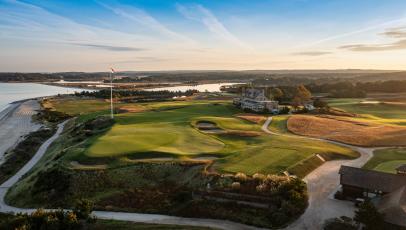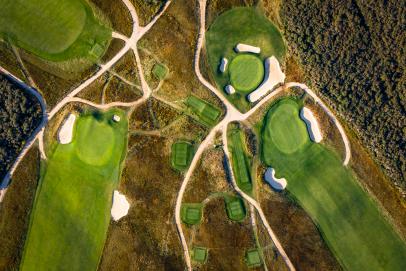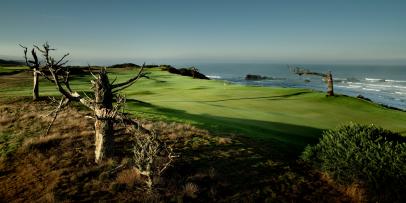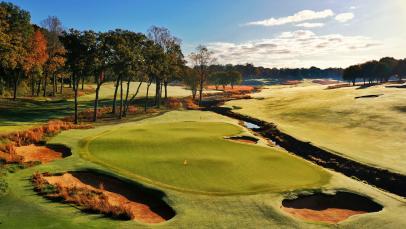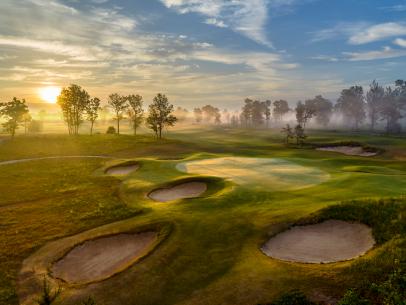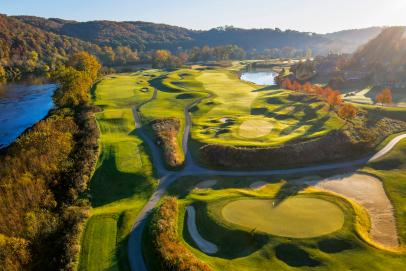Deeper dive
The First 25 Out: These courses just missed our latest ranking of the 200 best courses
The margins can be so close. Despite collecting more than 85,000 course evaluations from our 1,800-plus expert panelists over a 10-year cycle, the differences between a coveted spot on one of our course lists can be incredibly slight. The first course out of our most recent America’s 100 Greatest—No. 101, Crooked Stick Golf Club in Carmel, Ind.,—came two hundredths of a decimal point from securing a spot in the first 100.
Continue down to the bottom of our most recent America’s Second 100 Greatest ranking. Two courses, Forest Dunes Golf Club in Roscommon, Mich., and The Bridge in Sag Harbor, N.Y., both came less than a hundredth of a decimal point away from earning a spot in the top 200.
If you extend it out further, even No. 225 in our most recent rankings, Yale Golf Course, came within a half of a point of a spot in the top 200. We look at how tight these results are every time our new America’s 100 Greatest, Second 100 Greatest, Best in State and 100 Greatest Public rankings come out, and this time around we decided: Why not give recognition to these courses that are on the cusp of making a move into our next national ranking?
For the first time ever, we’re releasing “The First 25 Out”—which are all courses that met our minimum threshold of having 50 evaluations over our 10-year cycle—and whose scores became a stubborn victim of statistical calculation.
Be sure to click through to each individual course page for bonus photography and reviews from our course panelists. We also encourage you to leave your own ratings on the courses you’ve played … so you can make your case for why a course should be higher or lower on our rankings.
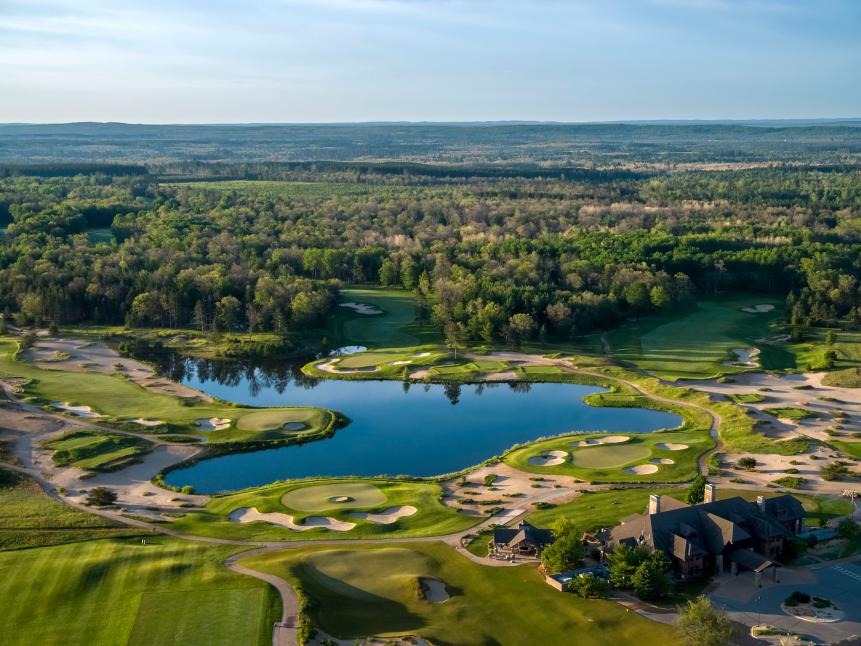
Forest Dunes has previously been ranked on both of our 100 Greatest (2011-'12) and Second 100 Greatest (2013 through 2020) lists.
From Golf Digest Architecture Editor emeritus Ron Whitten: The Tom Weiskopf-designed Forest Dunes in Michigan is a terrific layout on a terrific piece of property, with sand dunes deposited by the nearby Au Sable River and covered with mature pines. But it's not a unique piece of property. When I first played it, I was struck by how much Forest Dunes resembles a Texas course designed by Weiskopf's former partner, Jay Morrish. That course, Pine Dunes in Frankston, Texas, is built on much the same terrain, sand dunes covered in pines. Though they were working at the same time on their respective projects (Forest Dunes was completed in 2000 but didn't open until 2002; Pine Dunes opened in 2001), I don't think Weiskopf or Morrish had any idea that they were working on such similar courses, and I don't think they stole each other's ideas. But it's uncanny how they created kissing-cousin courses. Or maybe not. The two worked together for over a decade before splitting up in 1996, and they shared a common philosophy of course design.

The Bridge has yet to be ranked on our 100 Greatest or Second 100 Greatest lists.
The Bridge, which opened in 2002 and is one of the newest clubs in the Hamptons, has an initiation fee nearing $1.5 million. Yet it is anything but a hidebound, traditional club. Wearing jeans, cargo shorts or a cap turned backward is not only OK, it's encouraged, if that's how you want to express yourself. The glass-walled, modernistic clubhouse (pictured) looks like a turbine engine spun out of control. The most spectacular views of the Rees Jones course and Peconic Bay are not from the dining room but from the expansive locker rooms, because that's where members hang out most.

Stock Farm has yet to be ranked on our 100 Greatest or Second 100 Greatest lists.
Situated in the Bitterroot Valley in western Montana near the Idaho border, Stock Farm Club was developed in part by finance executive Charles Schwab. The club features a Tom Fazio design ranked among the best in the state with terrific views of the Sapphire Mountains. Fazio took advantage of the dramatic setting by creating numerous elevated tees, which we were restored in 2019 along with the greens and bunkers. Other activities at this exclusive private club include fly-fishing, horseback riding and shooting.
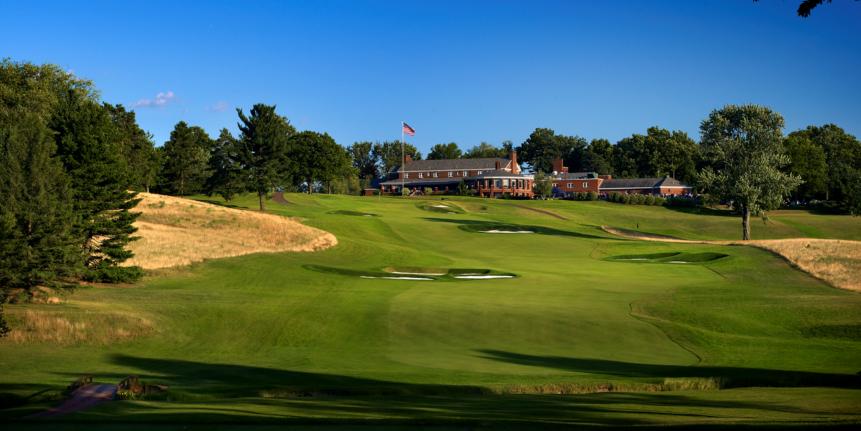
Brookside Country Club has yet to be ranked on our 100 Greatest or Second 100 Greatest lists.
Brookside Country Club was designed by Donald Ross in 1922 and is among the top-ranked courses in Ohio. Except for some well-placed fairway bunkers, Brookside is forgiving off the tee but is quite challenging around the greens, which are bold and exceptionally undulating. Given the difficulty of the greens, it is helpful to play each hole backwards when strategizing off the tee, as staying on the proper side of tricky pins is essential to scoring.
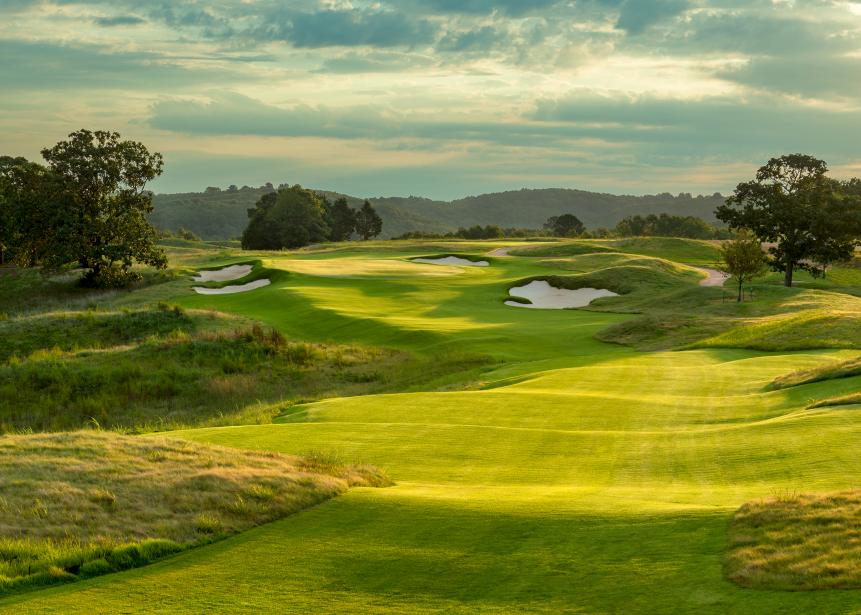
Ozarks National was ranked 155th on our 2021-'22 Second 100 Greatest list.
The Ozarks of southern Missouri are not tall, but their ridge-and-valley topography provide a sense of heightened elevation. Ozarks National at Big Cedar Lodge takes advantage of the illusion with holes that run out along ridgetops and onto elongated fingers of land that fall off into wooded ravines. Formerly the site of a different, much narrower golf course, Coore & Crenshaw found ways to widen out many of the same spaces and added new holes on previously unused parts of the property. Though not as broad as is customary for the designers, the cant of the holes and the engaging fairway bunkering put a premium on shaping shots and hitting the correct line off the tee.
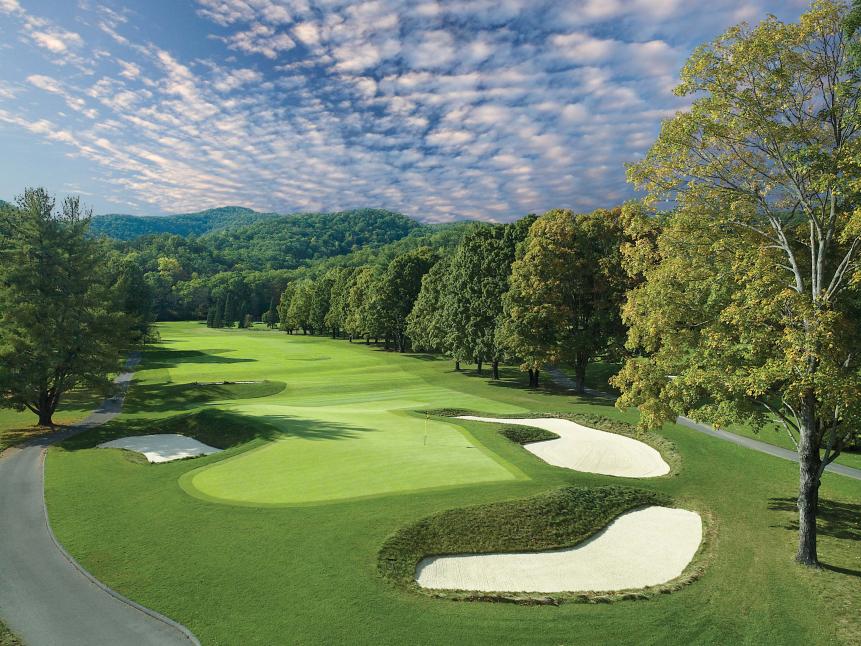
The Old White course was ranked on our Second 100 Greatest list from 2015-'22.
C.B. Macdonald’s early American design of the Old White at The Greenbrier was always respected, especially after Lester George’s 2007 restoration re-established such things as a Principal’s Nose bunker and Dragon’s Teeth mounds. Golf Digest panelists rediscovered its pleasures and ranked it the Best New Public Remodel of 2007. Soon, owner Jim Justice began sponsoring an annual PGA Tour event. Then came devastated floods in July, 2016, which claimed lives and destroyed several Old White holes. Another architect, Keith Foster, supervised a total rebuild of the famed course in less than 12 months, in time for the following year’s PGA Tour event. As a result, The Old White was named Golf Digest’s Best New Remodel again in 2017.

The Vintage Club was ranked on our 100 Greatest list from 1987-'92 and was 196th on our Second 100 Greatest list in 2021-'22.
The Vintage Club proved to be the last collaboration between former tour golfer-turned-architect George Fazio and his young nephew, Tom. But while George was heavily involved in promoting this exclusive Palm Springs area club to prospective members, Tom was sweating the details out on the construction site. The opulent course was built for $6 million, considered an outrageous amount at that time, but Tom explained that sum was necessary in order to “create an environment where none existed,” a phrase he would repeat later in the decade when constructing No. 27 Shadow Creek in Las Vegas. Tom spent $1.5-million building just The Vintage’s 16th and 17th holes, including three cascading waterfalls at $175,000 apiece. It was money well spent.
 - Jon Cavalier.jpeg.rend.hgtvcom.861.485.suffix/1573163040843.jpeg)
Torrey Pines South was ranked on our 100 Greatest list from 1969-'74 and was 198th on our Second 100 Greatest list in 2021-'22.
Torrey Pines sits on one of the prettiest golf course sites in America, atop coastal bluffs north of San Diego with eye-dazzling views of the Pacific. Rees Jones’ remodeling of the South Course in the early 2000s not only made the course competitive for the 2008 U.S. Open (won by Tiger Woods in a playoff over Rocco Mediate), it also brought several coastal canyons into play for everyday play, especially on the par-3 third and par-4 14th. An annual PGA Tour stop, Torrey Pines received another boost by Jones prior to hosting its second U.S. Open in 2021, this one won by Jon Rahm.
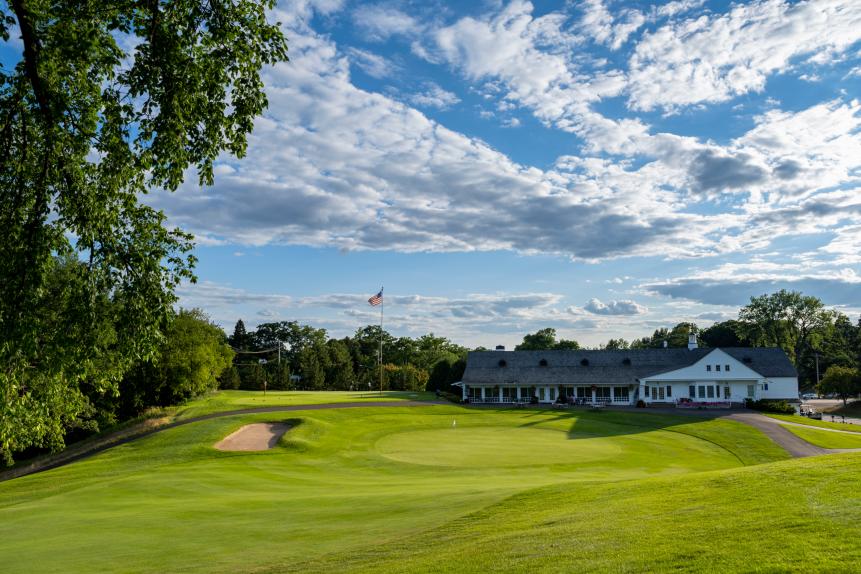
White Bear Yacht Club was ranked 191st on our Second 100 Greatest ranking in 2017-'18.
Before he moved to California where he laid the foundation of many of that state's best courses from the pre-Depression era, William Watson was a pioneer of golf in Minnesota. He arranged the first nine holes at White Bear Yacht Club in 1912 near the shore of White Bear Lake on some of the most roly-poly land imaginable. Several years later, Donald Ross, it is believed, added nine holes and remodeled the course. That rumpled, unmodified land is the heart and soul of White Bear Yacht Club. Modern architects would likely have leveled and softened the slopes and ravines, but here they bring the golf to life visually and psychologically, offering nary a level stance and asking the player to hit approaches with extreme control. Over the last two decades under the guidance of Jim Urbina the surrounding canopy of forest has been pared back to better reveal the massive, enthralling undulations of the course.
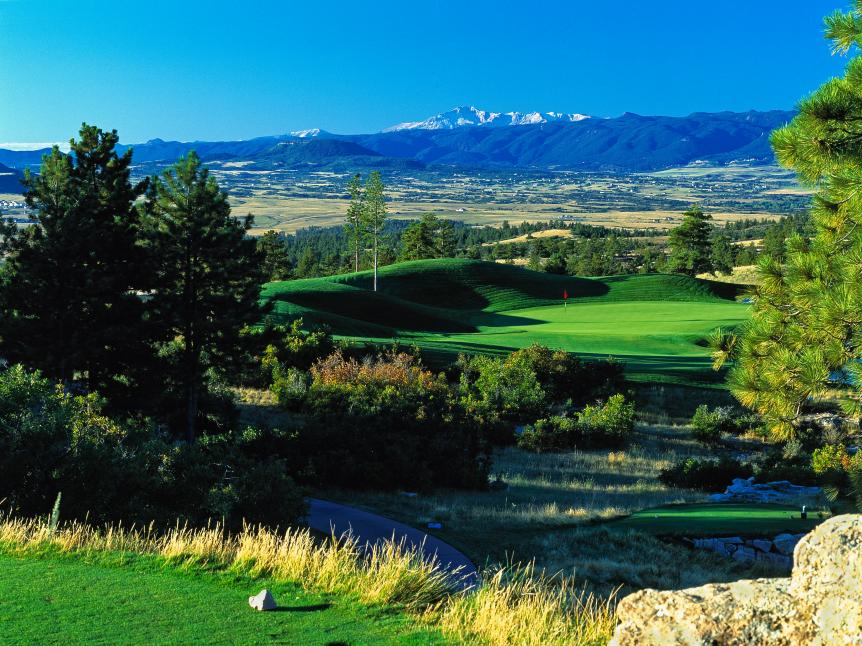
Sanctuary has previously been ranked on our 100 Greatest list and most recently was ranked on our Second 100 Greatest list from 2013-'20.
In the late 1990s, Sanctuary debuted as a counterpoint to what was then the latest fashion, the startlingly outrageous architecture of Mike Strantz. Coloradoan Jim Engh introduced his stylistic philosophy of incorporating Art Deco themes of parallel lines, sweeping curves and repetitive patterns in his bunker, fairway and green shapes. The comforting nature of his architectural style proved to be popular and soothing to many golf fans. But Sanctuary’s site itself is startling. The first tee shot drops 200 feet. Fairways twist and tumble down narrow valleys and over chasms. Enormous greens are protected not just by Engh’s squiggly bunkers but by giant transplanted pines. Sanctuary’s developers, Dave and Gail Liniger, founded the Re/Max real estate empire, but they insisted that Sanctuary have no homes that could disturb the tranquility of the course. It’s a Sanctuary indeed.
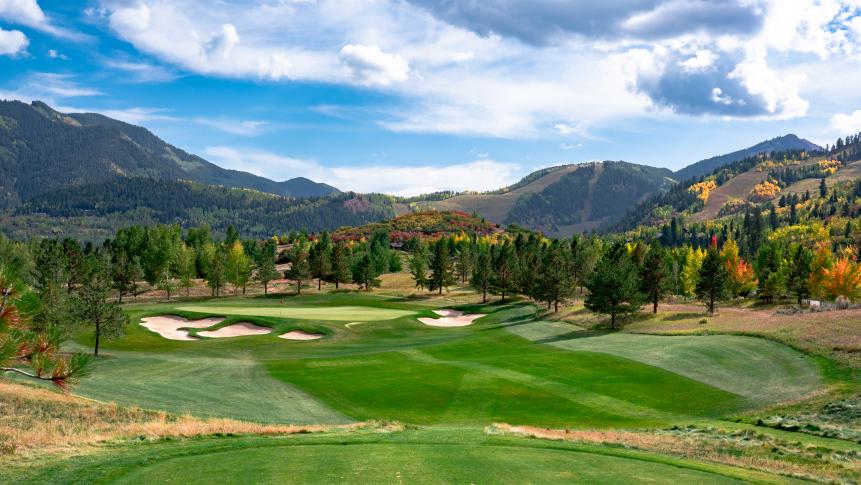
Maroon Creek has yet to be ranked on our 100 Greatest or Second 100 Greatest lists.
The stretch of golf at Maroon Creek beginning at the par 4 fourth and ending at the 16th is one of the finest in Colorado. Tumultuous terrain paired with design elements employed by Tom Fazio allows for an incredible experience outside Aspen. The holes feel natural to the land, and Fazio’s routing constantly provides a challenge from start to finish. The constant change in elevations means golfers must correctly judge their distances on every shot. Off the tee Fazio offers some reprieve as oftentimes a good shot will find a speed slot, providing an opportunity to score, but the well-guarded greens means golfers are not out of the woods just with a good drive.
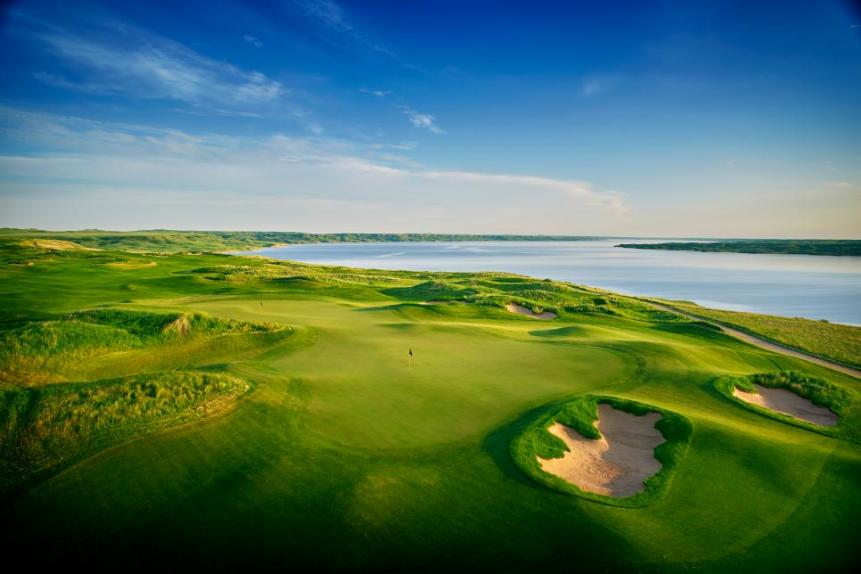
Sutton Bay has yet to be ranked on our 100 Greatest or Second 100 Greatest lists.
Like Bandon Dunes and Sand Hills before it, Sutton Bay is a continuation in the modern trend of great golf courses being built in remote locations. Situated 40 miles northwest from Pierre, S.D., Sutton Bay was created by South Dakota native Mark Amundson who wanted to create a retreat with golf, hunting and fishing. He found his spot on a piece of land on Lake Oahe, perfect for all three. Amundson hired Graham Marsh who wrote in the course’s yardage book, “The brief for the golf course was simple. The course should be playable yet challenging, keep earthworks to a minimum, and preserve the natural landscape.” Marsh certainly achieved his goal, the course feels placed within—not on top of the land, with unique landforms, sprawling bunker complexes and beautiful views, the course well earns the top spot in South Dakota.

Omaha Country Club has yet to be ranked on our 100 Greatest or Second 100 Greatest lists.
Opened in 1899, Omaha Country Club is one of the oldest clubs in the Midwest. The course has some incredibly undulating topography that captivates the golfer with a great mix of uphill and downhill holes. Despite being situated in a flat part of the country, Omaha’s elevation changes separates it from its peers. In addition, the green complexes are severely contoured with some pin positions allowing for scoring opportunities and others adding to the resistance to scoring.
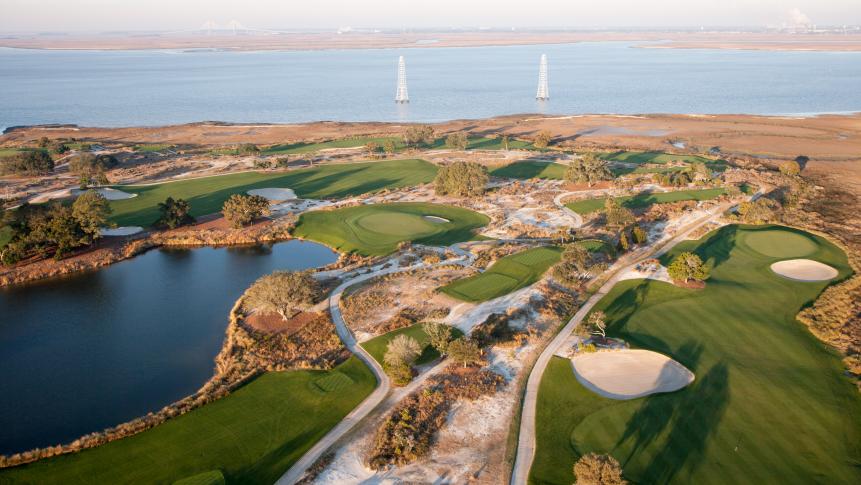
The Seaside course was ranked on our Second 100 Greatest list from 2013-'22 and was 176th in 2021-'22.
The Sea Island resort continues to credit famed British golf architect H.S. Colt for its Seaside design, but in truth it was never purely Colt's design. It was the work of Colt's partner, Charles Alison, who traveled to the U.S. and beyond in the 1920s and 30s while Colt remainied in England. But the Seaside Course isn't even Alison's anymore--it is purely Tom Fazio, who incorporated Alison's original Seaside nine (today's 10-18) along with a nine (the Marshland Nine) designed in 1974 by Joe Lee, to create a totally new 18- hole course. But in keeping with the resort’s heritage, Fazio styled his new course in the design fashion of Alison, with big clamshell bunkers, smallish putting surfaces and exposed sand dunes off most of the windswept fairways. The Seaside Course has hosted numerous USGA championships and has been a mainstay of the PGA Tour’s early season roster for many years.
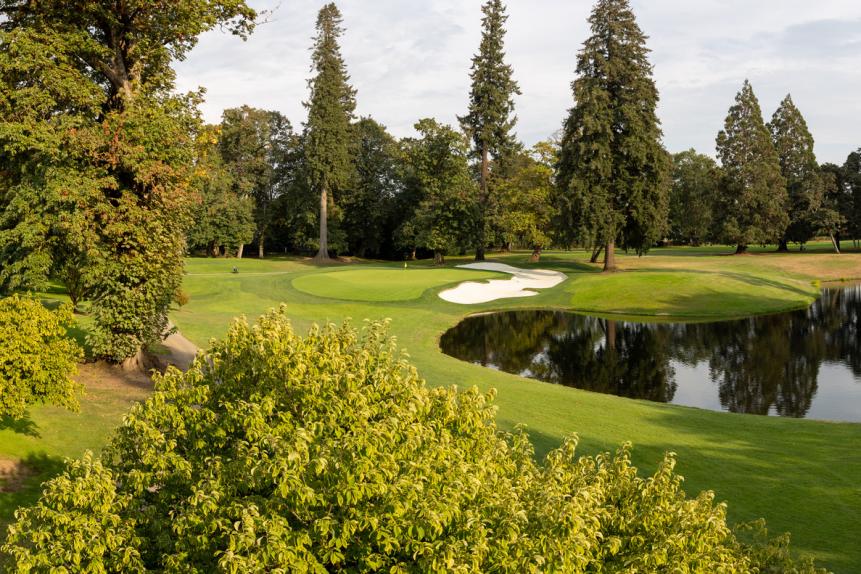
Eugene Country Club was ranked on our 100 Greatest list for 36 years and most recently was ranked on our Second 100 Greatest list from 2013-'22.
Eugene was the site of one of golf most profound renovations in 1965 when Robert Trent Jones reversed the direction of each hole on the H.C. Egan design, building long tee boxes, all new greens and stylized bunkers that pinch targets and turn doglegs—turning Eugene Country Club into one of the most challenging in the Pacific Northwest. The 2021 renovation wasn’t so radical, but the changes initiated by Tim Jackson and David Kahn have made the course more thought-provoking through the shifting of tees, remodeling of bunkers, the expansion of greens that bring more hole locations into play and a renewed emphasis on using the unique ground contours and swales as more strategically influential factors. The towering Douglas fir trees still frame each hole and influence much of a golfer's strategy from tee to green.
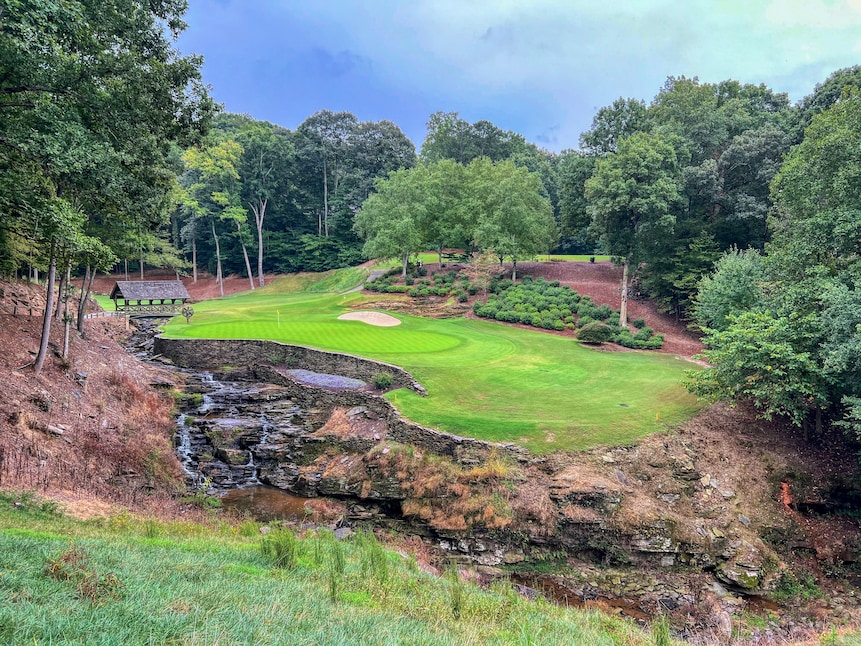
Atlanta Country Club has previously been ranked for 26 years on our 100 Greatest list and more recently was ranked on our Second 100 Greatest list from 2015-'22.
For over a decade, the most spirited debate in golf was over who really designed the really fine Atlanta Country Club. Both Willard Byrd of Atlanta and Joseph S. Finger of Houston claimed the honor. Both lobbied Golf Digest hard for the architectural credit, but neither provided much supporting documentation. Both architects are deceased now, and from what we can piece together, Byrd landed the original contract in the early 1960s, but was still more land-planner than course architect in those days, so the club brought in Finger to finish the job. We give them both credit for this hilly, strategic design, a solution neither architect would likely have accepted. Atlanta resident and former Jack Nicklaus associate Mike Riley remodeled the course in the early 2000s and his work helped put the course back in the America's 100 Greatest Courses ranking in 2003 after it had fallen off in 1997. Now architect Beau Welling is working with the club, and the results of his renovation will be revealed in 2024.

The Broadmoor Golf Club East was ranked on our Second 100 Greatest list from 2013-'22.
The Broadmoor Golf Club East is another timeless mountain course, built hard against Cheyenne Mountain with famed green contours that pose optical illusions. Many putts that look uphill are actually running downhill. Few golfers recognize that the East Course is a combination of nine Donald Ross holes (one through six and 16 through 18) and nine more added 30 years later by Robert Trent Jones (holes seven to 15), though a road crossing helps delineate these lower and upper holes. The East Course was the site of Jack Nicklaus’ first U.S. Amateur win in 1959 and Annika Sorenstam’s first U.S. Women’s Open win in 1995. It has also hosted 2011 U.S. Women’s Open won by So Yeon Ryu and the 2018 U.S. Senior Open won by David Toms, their first major victories as well (at least the first on the Senior circuit for Toms).

218. Trump International Golf Club West Palm Beach: Championship
West Palm Beach, FL, United States
Trump International West Palm Beach was ranked 84th on our 100 Greatest list in 2005-'06 and more recently was ranked on our Second 100 Greatest list from 2013-'22.
Long before he was President of the United States, or even a TV reality show host, Donald Trump built a golf course, on prime real estate in West Palm Beach, which he got from Palm Beach County. In exchange for a 100-year lease, Trump agreed not to sue the county for noise disturbance to Mar-A-Lago resort. He hired Tom Fazio’s older, less-celebrated brother Jim Fazio to design a course that would rival Trump’s casino rival Steve Wynn’s baby, No. 27 Shadow Creek in Vegas. Jim moved 2 million cubic yards of dirt to create 58 feet of elevation change and planted 5,000 mature trees. Lakes linked by recirculating streams were built, as was a monolithic waterfall on the 17th. The result is Shadow Creek Southeast. “Steve Wynn is a friend of mine,” Trump said in a 1999 interview. “I did get certain ideas from Shadow Creek because I think he did a very good job. I made them bigger and better.”

Desert Forest was previously ranked for 36 years on our 100 Greatest list and more recently was ranked on our Second 100 Greatest list in 2013-'14 and 2017-'18.
Widely considered to be the first desert course ever built, Desert Forest was designed by Robert “Red” Lawrence—a founding member and president of the American Society of Golf Course Architects—and opened in 1962. Revered for its minimalist design and effective use of the natural contours of the land, the course has been previously ranked on our 100 Greatest and Second 100 Greatest lists. In 2013, the course underwent a $3 million renovation led by David Zinkland—a longtime associate of the Coore and Crenshaw design firm—which improved sightlines from tee boxes, added strategic bunkering and refined the greens. Referred to by our own Mike Stachura as “an American golf course design landmark,” Desert Forest is deceptively simple, with few fairway bunkers or doglegs, but requires thoughtful strategy to manage the undulating layout.

Mountain Ridge has yet to be ranked on our 100 Greatest or Second 100 Greatest.
Mountain Ridge Country Club has forever been one of North Jersey's great hidden gems, and after fabulous restoration work done over the past 10 years by Ron Prichard, the club is starting to get its due after hosting a number of events, including the 2012 U.S. Senior Amateur on its centennial, the 2020 MET Open and the 2021 LPGA Cognizant Founders Cup. This 250-acre site, perched atop an enormous ridge in West Caldwell, was acquired by the club after a move from nearby West Orange, and the club hired Donald Ross in the late 1920s to route a new 18-hole course, which traverses varied, interesting topography and features some genius putting surfaces. Mountain Ridge had a large-scale celebration in June 1931 to dedicate the Clifford Wendehack clubhouse and new course, of which Ross himself attended. The club has hired Andrew Green to complete a long-term plan to ensure that Mountain Ridge continues to be in the conversation as one of the country’s best-known secrets.
.jpg.rend.hgtvcom.861.646.suffix/1573225587666.jpeg)
Skokie Country Club was ranked 97th on our 100 Greatest list in 1993-'94.
Skokie Country Club is a classic championship venue that boasts a strong history and a unique combination of contributions from Tom Bendelow, William Langford, Theodore Moreau and Donald Ross. It has withstood the test of time with a strong collection of short and long par 4s, offering a great variety of risk-and-reward opportunities. The course is fair, balanced and promotes accuracy and requires a moderate level of precision. The challenge is presented through bunkering, tree-lined fairways and large contoured greens. With wider fairways and run-up options to many greens the course is very playable for gofers of all ability and presents a very enjoyable experience.

Trinity Forest has yet to be ranked on our 100 Greatest or Second 100 Greatest.
Once a drab, treeless, 165-acre tabletop city dump perched above the tree-lined Trinity River, Bill Coore and Ben Crenshaw transformed it into one of the most interesting designs in modern architercture. When Coore first saw the site, he ignored the abandoned refrigerators and scattered tires to focus on the flow of the land. It was a series of ridges and ripples formed as parts of the closed landfill settled over time. "It needed a good ironing," Coore joked. In the end his construction crew, though capping the site with a thick layer of sand in which to grow grass and create wasteland roughs, took pains to preserve every dip, trough, hump and hollow. It hosted the 2019 and 2020 AT&T Byron Nelson. Trinity Forest was night and day from any other venue on tour. As Curt Sampson wrote for Golf Digest, Trinity Forest "was night and day from any other venue on tour -- this windswept, nearly treeless expanse of dunes, waving prairie grass, and fast, undulating turf, the new place has every attribute of a links except cawing sea birds and an ocean." Not too many players embraced the cerebral, pinball-ish ground game offered to access some of these greens and navigate the interesting humps and bumps here. Of course, tour winner turned architect Geoff Ogilvy: “I love it,” Ogilvy said. “Strategically, it’s so interesting. It’s got everything that’s missing from modern architecture. There are ways to challenge golfers besides long rough and narrow fairways.” There are also architectural marvels like a double green, great short par 4s and short par 3s. It's too bad the tour won't return to Trinity Forest, but golfers lucky enough to get an invite will continue to enjoy it.
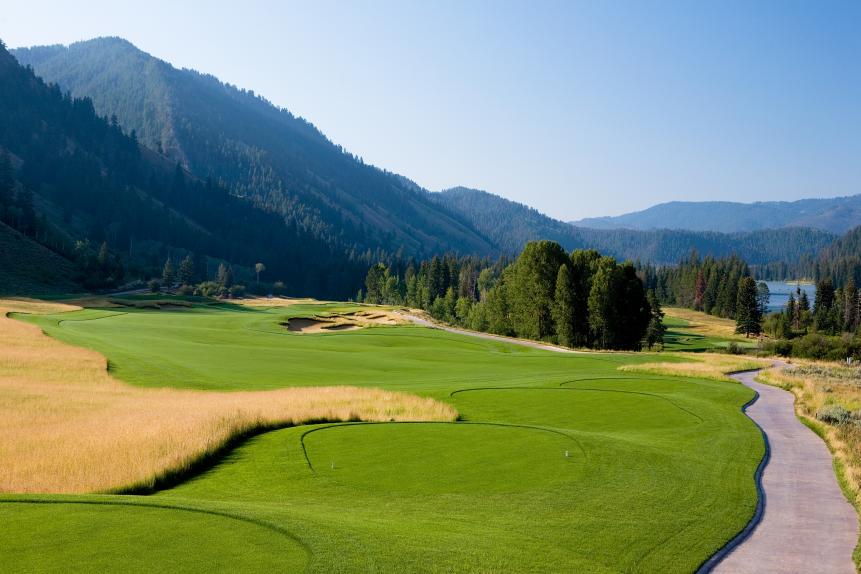
Snake River has yet to be ranked on our 100 Greatest or Second 100 Greatest.
Just south of Jackson Hole, the Snake River Sporting Club is a four-season resort and residential community with a Tom Weiskopf-designed course that embraces the natural contours of the river valley. Set beside the 1,078-mile-long Snake River and surrounded by mountains, the scenic course winds through tall cottonwoods and sagebrush. The signature par-3 15th is nearly an island green, surrounded not by water but by native grasses which beautifully frame the hole against the backdrop of the Snake River.
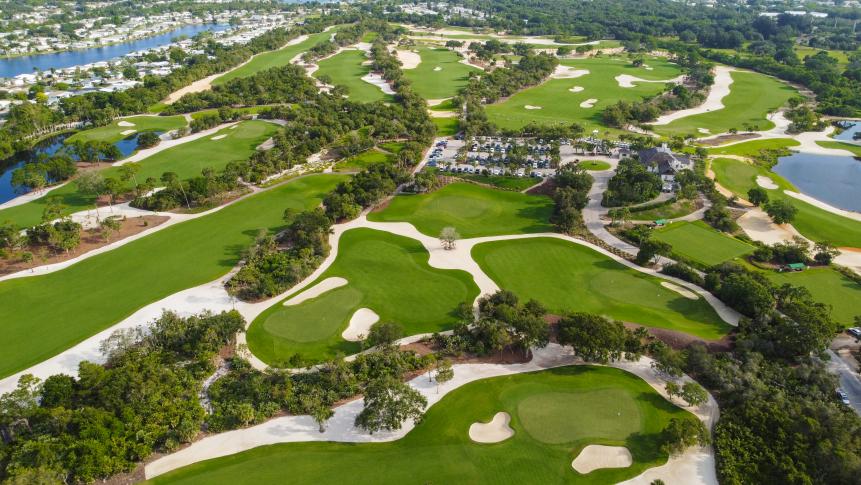
John's Island West has yet to be ranked on our 100 Greatest or Second 100 Greatest.
John's Island West was one of the last courses Tom Fazio and his associates completed as they were getting into the thick of building Shadow Creek in Las Vegas. In that regard, the course fittingly marks an end to an early Fazio phase, one before it became increasingly clear to him that, for the skills of he and his staff to be maximized, the project's budget and ambition were more critical than having strong natural assets to work with. John's Island, like Jupiter Hills an hour south, did have strong natural assets, namely a series of sand ridges, some up to 50 feet high, that were used to prop up a number of greens and tees. This provided attractive views, tough targets, and much needed relief amid a site thick with dense undergrowth. Several lakes were excavated for added fill and the surfaces of the course were cut and molded with sandy finger-like transition areas and bunkers, but the overall feel of the course is calm and not engineered. It's a wonderful snapshot of a creative use of existing land, one burnished further by Fazio's 2022 renovation.
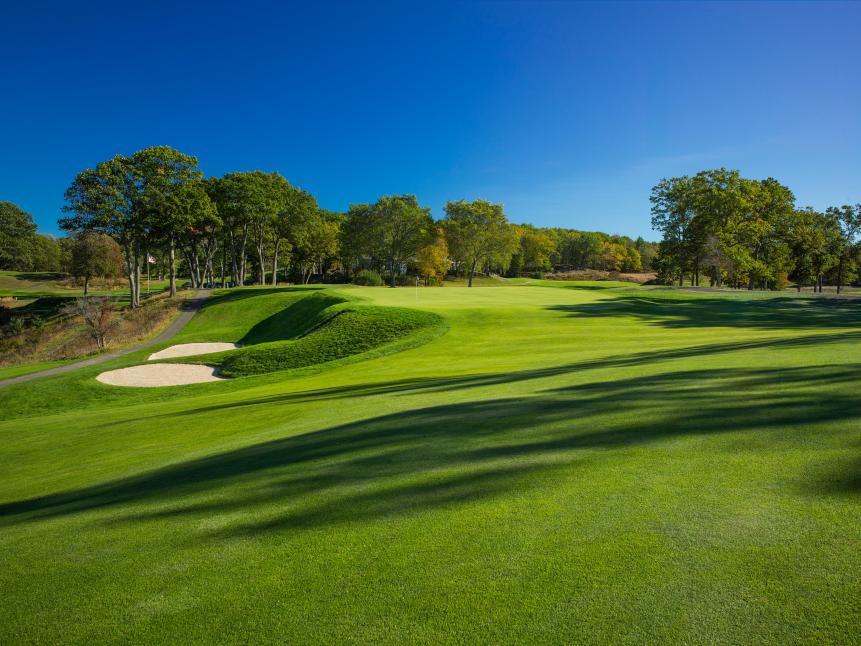
Yale was ranked on our 100 Greatest from 1969-'76 and more recently was ranked on our Second 100 Greatest from 2013-'18.
Yale has always been something of a sleeping giant. For a variety of reasons the course has rarely lived up to its full potential, either due to inconsistent conditioning or some ill-considered changes through the decades that moved the architecture off its brilliant 1926 C.B. Macdonald and Seth Raynor design. Given the handicaps, it's remarkable Yale has continued to be so breathtakingly profound. The Leviathan-sized golf course bulges with magisterial holes like the Road, Cape, Knoll and the world’s best Biarritz chiseled onto the rocky, tumbling site. Recently made public, it's one of the few places in the U.S. (notably alongside the Old White course at The Greenbrier) where the general public can experience true Macdonald/Raynor architecture. The sleeping giant is about to awaken as Gil Hanse and Jim Wagner will go to work on reestablishing the original hole concepts and upgrade turf and drainage following the 2023 season.
